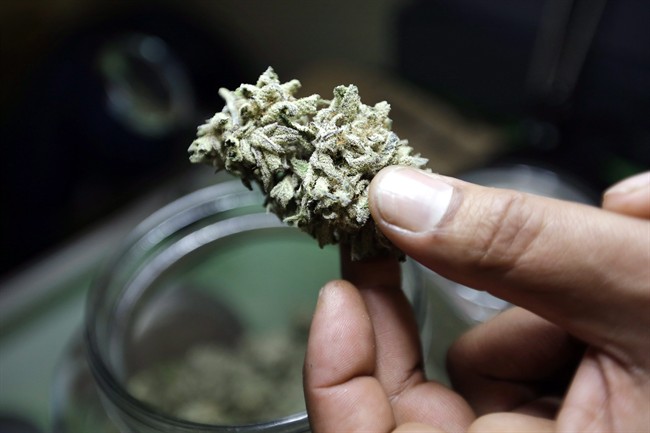A human rights board has determined a Nova Scotia man’s prescribed medical marijuana must be covered by his employee insurance plan, a ruling that advocates say will likely have impact nationwide.

READ MORE: Insurance coverage for medical marijuana coming, industry experts say
Gordon “Wayne” Skinner, of Head of Chezzetcook, suffers from chronic pain following an on-the-job motor vehicle accident, and argued that he faced discrimination when he was denied coverage.
In a decision Thursday, inquiry board chair Benjamin Perryman concluded that since medical marijuana requires a prescription by law, it doesn’t fall within the exclusions of Skinner’s insurance plan.
Perryman ruled the Canadian Elevator Industry Welfare Trust Plan contravened the province’s Human Rights Act, and must now cover his medical marijuana expenses “up to and including the full amount of his most recent prescription.”
“Denial of his request for coverage of medical marijuana … amounts to a prima facie case of discrimination,” the ruling states. “The discrimination was non-direct and unintentional.”
READ MORE: 53% of Atlantic Canadians support marijuana legalization: poll
Deepak Anand, executive director of the Canadian National Medical Marijuana Association, said the ruling is significant and could see a number of people apply for coverage through their provincial human rights commissions.
“If they could start to use this avenue to try to get their employers or insurance providers to start covering it, I think that’s going to be significant and we are going to see more of that,” said Anand.
Anand said he knew of one other instance where an insurance company agreed to cover medical marijuana – for University of Waterloo student Jonathan Zaid in 2015.
In the Nova Scotia decision, Perryman said the marijuana was medically necessary for Skinner.
“Since the medical marijuana in this case was prescribed pain management, it seems there is prima facie support for its medical necessity, owing to the fact that conventional prescription pain management drugs are normally eligible for coverage.”
READ MORE: Government to cut how much medical marijuana veterans can get for free
Anand said the reasoning is “significant on its own” because many private and public insurers don’t recognize cannabis and marijuana as a medicine.
“They (the inquiry board) are finally recognizing that prescription has some value, which so far the Canadian Medical Association and others have decided not to look at,” he said.
The ruling states the medical marijuana must be purchased from a producer licensed by Health Canada or a person legally authorized to produce for Skinner under the Access to Cannabis for Medical Purposes Regulations. The claim must also be supported by an official receipt.
Skinner, a former elevator mechanic with ThyssenKrupp Elevator Canada has been unable to work since the August 2010 accident.
“I’m elated, I’m still in shock it’s really still sinking in to be honest with you,” Skinner said in a telephone interview from his home outside Halifax.
He argued his own case before the board last October after being denied coverage three times, and said he hoped the inquiry board’s ruling would set a precedent.
“Hopefully this will help other people in similar situations and eliminate the fight that myself and my family have had to endure and the hardship that this has resulted in.”
Perryman found that Skinner’s chronic pain has been under-managed as a result of the denial of coverage, resulting in “profoundly negative effects on the complainant and his family.”
READ MORE: Marijuana just one element of mental health treatment, users say
He also found that the plan’s justification for non-coverage was “wholly inadequate.”
“There was no evidence presented to suggest that premiums would have to be increased or that the financial viability of the plan would be threatened,” he wrote.
The Canadian Life and Health Insurance Association wouldn’t comment on Skinner’s case, but said in general it’s up to employers to decide if they want to cover medical marijuana under their group medical plan.
“We do not anticipate any impact on group benefit plans as each plan is unique, but will be reviewing the ruling,” the association said in an email.
For his part, Skinner said the human rights ruling has lifted a large weight from his shoulders.
“Just to have that security of knowing that these medications that are absolutely necessary for me to have any functionality are going to be provided for, just alleviates so much stress and hardship on my family,” he said.



Comments